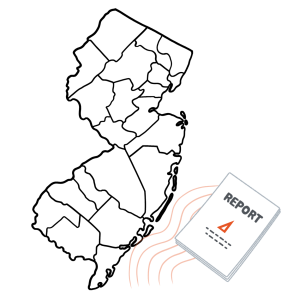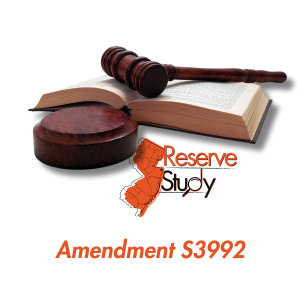S3992: Amending Legislation to New Jersey’s S2760 Structural Integrity and Reserve
The New Jersey Legislative Action Committee (NJ-LAC) announced Governor Phil Murphy signed Senate Bill No. 3992 (S3992) into law on August 21, 2025.
Sponsored by Senator Troy Singleton, Assemblywoman Yvonne Lopez, Assemblyman Sterley S. Stanley, and Assemblywoman Tennille R. McCoy, this legislation directly responds to concerns raised by homeowners, boards, and managers regarding the reserve funding provisions of S2760, the landmark Structural Integrity and Reserve Funding legislation signed into law on January 8, 2024.

The NJ-LAC worked closely with Senator Singleton in drafting both the original bill and this amendment, providing testimony and guidance that helped ensure the law is both enforceable and responsive to community needs. The amendment passed unanimously in both houses before reaching the Governor’s desk.
What S3992 Changes
Importantly, S3992 amends only the reserve funding section of S2760. It does not alter the structural inspection or safety requirements.
Instead, it introduces seven key updates designed to clarify obligations and provide some flexibility for associations struggling with underfunded reserves.
1. Clearer Definition of “Adequate” Reserves
Under the original S2760 legislation, the term “adequate” reserve funding created confusion among boards, managers, and professionals because it lacked a precise definition. Some interpreted it as maintaining a fully funded plan at all times, while others assumed partial or minimal funding could qualify as “adequate.”

S3992 resolves this ambiguity. The law now makes it clear that a capital reserve funding plan is considered adequate if, over the required 30-year funding period, the reserve balance never falls below zero dollars. In other words, associations must plan their contributions and expenditures so that projected expenses can always be covered without the fund going into a deficit.
This clarification establishes a uniform baseline standard across all community associations. It ensures that every association—large or small, well-funded or historically underfunded—works toward the same measurable goal: keeping reserves solvent and sustainable.
For boards, this means reserve funding decisions are no longer subjective or open to interpretation. For homeowners, it means greater financial transparency and protection against unexpected assessments that could arise if a reserve fund were mismanaged.
2. Baseline or Zero-Threshold Funding Requirement
Under New Jersey’s S3992 amendment to S2760, all reserve studies must now include at least one baseline or “zero-threshold” funding plan. This projection shows a 30-year cycle in which the reserve fund balance will reach zero at one or more points.
This requirement was designed to address the financial challenges many New Jersey condominium and homeowners associations face, particularly those that have been underfunded for years. For these communities, moving immediately to a fully funded reserve plan under the original S2760 legislation was financially unrealistic. By requiring reserve studies to include at least one zero-balance scenario, S3992 creates a compliance pathway that allows associations to meet the law’s requirements while working within their financial means.

However, the risks of a zero-threshold plan are clear. Because the balance is projected to reach zero, the association has no cushion if building systems or common elements—such as roofs, siding, elevators, or parking lots—fail sooner than expected or cost more to replace than anticipated.
In those cases, boards may be forced to levy special assessments or seek loans, which can put additional financial strain on homeowners.
Still, the inclusion of a baseline plan in every study ensures that boards and unit owners in New Jersey see the full range of funding scenarios, from fully funded to minimally compliant. This transparency empowers associations to make more informed decisions while recognizing that for some communities, the baseline plan is a realistic first step toward stronger long-term reserve funding.
3. Funding Options for Existing Associations
One of the most practical elements of New Jersey’s S3992 amendment is the flexibility it provides to associations that were already in existence when the law took effect. Lawmakers recognized that many New Jersey condominium and homeowners associations entered this new era of structural integrity and reserve funding with varying levels of preparedness. Some had well-documented and adequately funded reserves, while others had little to no financial planning in place.

To balance these realities, S3992 gives existing associations two funding options:
Fund reserves in accordance with the most recent reserve study
This option applies to associations that already have a capital reserve study prepared by a Reserve Specialist, licensed engineer, or architect. Following this plan ensures the association is funding at the levels recommended by professionals and staying on a sustainable path.
Fund reserves at 85% of a recommended funding plan
For associations that may be significantly underfunded, the law allows them to contribute at 85% of the plan recommended by their most recent study. This reduced level of funding provides a temporary reprieve for communities that might otherwise struggle to meet the full financial demands immediately.
While the 85% option offers some relief, it is not without consequences. Associations choosing this approach must:
Provide clear and bold notice (20-point font) to all unit owners explaining that reserves are being funded at 85% of the plan.
Disclose when the reserve balance is projected to fall short and when a special assessment or loan is anticipated as a result of reduced contributions.
Clearly state the estimated dollar amount of the anticipated assessment or loan.
4. Mandatory Owner Notice for 85% Funding
Boards that elect to use the 85% funding option are required to provide clear, written notice to all unit owners in 20-point bold font. This notice must explain three critical details:
-
That the board has chosen to fund reserves at 85% of the 30-year capital reserve plan recommended in the most recent study,
-
The specific year when the reserve balance is expected to fall short and a special assessment or loan will likely be needed, and
-
The estimated dollar amount of that future assessment or loan.
This requirement is intended to ensure full transparency for homeowners, so they are not caught off guard by reduced funding decisions and the financial consequences those decisions may bring.
5. Buyer Disclosure Requirement
S3992 New Jersey also places responsibility on individual sellers when an association adopts the 85% funding option. In these cases, before the sale of any residential unit can be finalized, the seller must provide the buyer with a copy of the most recent reserve funding notice issued by the association.
This disclosure ensures that potential buyers are fully aware of the association’s financial strategy and any anticipated shortfalls in the reserve fund before making their purchase decision. By seeing in writing that reserves are funded at 85%—along with the projected year and amount of any special assessment or loan—buyers can make more informed choices about the financial obligations they may face after closing.
For sellers, this requirement adds an extra step in the transaction process, but for buyers, it provides an important layer of financial transparency and consumer protection, reinforcing the legislature’s goal of avoiding surprises related to future community costs.
6. Five-Year Limit on 85% Funding
While the 85% funding option gives associations in New Jersey some temporary relief, S3992 makes it clear that this method is not a permanent solution. Associations may only use the reduced funding approach for a maximum of five fiscal years.
After that period, the law requires boards to transition to at least a zero-balance (baseline) funding plan. This provision is designed to prevent long-term underfunding and to ensure that associations steadily move toward stronger financial footing.
The five-year limit strikes a balance: it gives boards time to adjust budgets, communicate with homeowners, and begin building healthier reserves, while still holding communities accountable to the law’s goal of long-term financial sustainability. For homeowners, this means the 85% option should be seen as a short-term bridge, not a permanent funding strategy.
7. Reserve Study Updates Every Five Years
S3992 New Jersey reaffirms one of the cornerstone requirements introduced under S2760: all community associations in New Jersey must update their reserve studies at least once every five years. This ensures that reserve funding plans remain accurate, current, and reflective of both the community’s physical needs and financial realities.
Equally important, the law specifies that these studies must be conducted by qualified professionals—either a Reserve Specialist (RS), licensed engineer, or licensed architect. This requirement guarantees that projections are based on sound technical expertise rather than informal estimates, which helps boards make informed decisions and protects homeowners from underfunding risks.
Regular updates are critical because building components such as roofs, façades, parking lots, and mechanical systems do not age in a perfectly predictable way. Costs for materials and labor can also fluctuate significantly over time. By requiring professional updates every five years, New Jersey law ensures that associations remain proactive, rather than reactive, in planning for major repairs and replacements.
For boards and homeowners alike, this provision underscores the importance of long-term financial stewardship and provides confidence that the reserve plans guiding their community are reliable, transparent, and professionally vetted.
Why This Matters for Community Associations
NJ-LAC views this amendment as a balanced approach. While it maintains strong mandates for reserve funding—critical for long-term structural integrity and financial stability—it also provides short-term relief for existing associations through the five-year 85% funding option.

By requiring clear owner notices, buyer disclosures, and transparency around future assessments, S3992 ensures that both boards and homeowners are fully informed of the financial realities and long-term obligations of their communities.
The passage of S3992 New Jersey represents an important step forward in the state’s efforts to ensure safe, financially stable, and well-managed communities. Associations should consult with their engineers, reserve specialists, and legal counsel to review their compliance strategies under this amended law.
The NJ-LAC will continue to work closely with legislators, regulators, and members to support effective community association governance in New Jersey.
Timeline of New Jersey Condo Safety Laws (S2760 & S3992) — 2021 to 2025
Jun 24, 2021 — Trigger Event (Surfside, FL)
The collapse of Champlain Towers South killed 98 people, spurring nationwide concern about structural safety. This tragedy became the catalyst for legislative efforts in New Jersey and beyond.
Jun 2, 2022 — NJ S2760 Bill Text Appears
The Structural Integrity & Reserve Funding bill text for S2760 was first published. Legislative work on the measure advanced through the 2022 session.
Jan 8, 2024 — S2760/A4384 Signed
Governor Phil Murphy signed S2760/A4384 into law. The statute requires periodic structural inspections and mandates reserve studies/funding plans for covered associations.
Jan–Mar 2024 — State Implementation Begins
The NJ Department of Community Affairs issued official materials outlining inspection timelines, reserve study expectations, and association obligations under P.L. 2023, c.214.
Dec 19, 2024 — S3992 Introduced (Amending S2760)
Bill S3992 was introduced to adjust reserve-funding requirements and add flexibility for underfunded associations.
Jan 30, 2025 — Community & Urban Affairs Committee
The committee released a statement clarifying S3992’s intent: modifying the capital reserve study, creating a 30-year funding plan, and adjusting reserve fund mechanics.
Jun 2, 2025 — S3992 Passes the Senate
S3992 cleared the Senate, advancing out of the upper chamber for further consideration.
Jun 30, 2025 — S3992 Passes the Assembly
The Assembly passed S3992 by a vote of 78-0-1, sending the bill to the Governor’s desk.
Aug 21, 2025 — S3992 Signed Into Law
Governor Murphy signed S3992 into law. Amendments clarified “adequate” funding, set an 85% contribution option for five years, and created a baseline (zero-threshold) funding plan.

FAQs: S3992 Amending New Jersey’s S2760 Structural Integrity and Reserve Funding Law
What is S3992?
S3992 is a New Jersey law signed by Governor Murphy on August 21, 2025. It amends the reserve funding portion of the S2760 Structural Integrity and Reserve Funding law, which took effect in 2024.
Does S3992 change the structural inspection requirements of S2760?
No. S3992 only affects reserve funding requirements. All structural inspection and reporting requirements under S2760 remain unchanged.
What does “adequate” reserves now mean under the law?
“Adequate” is now defined as ensuring an association’s reserve fund balance never falls below zero dollars during the 30-year funding period.
What is a baseline or zero-threshold funding plan?
This is a reserve funding plan where the balance reaches zero at one or more points during the 30-year projection. It gives underfunded associations a way to comply with the law, but carries risks because it provides no cushion if costs run higher than expected.
What are the funding options for existing associations?
As of the effective date of S3992 New Jersey, an association may either:
-
Fund reserves according to the most recent reserve study, or
-
Fund at 85% of a recommended funding plan for up to five years.
What happens if a board chooses the 85% funding option?
The board must:
-
Send unit owners a 20-point bold notice explaining the reduced funding,
-
State when a special assessment or loan is anticipated, and
-
Provide the projected amount of that assessment or loan.
Do sellers have disclosure obligations under the 85% option?
Yes. A seller must provide a copy of the most recent reserve funding notice to the buyer before the purchase of a residential unit.
How long can an association use the 85% funding method?
No more than five fiscal years. After that, a zero-dollar balance plan is the minimum standard.
How often must reserve studies be updated?
Every five years. The study must be conducted by a Reserve Specialist, licensed engineer, or licensed architect.
Why did legislators pass this amendment?
S3992 New Jersey was introduced in response to feedback from constituents and associations struggling with the financial burden of immediate compliance. It balances the need for strong reserve funding with short-term flexibility and transparency.
Learn More
"*" indicates required fields
